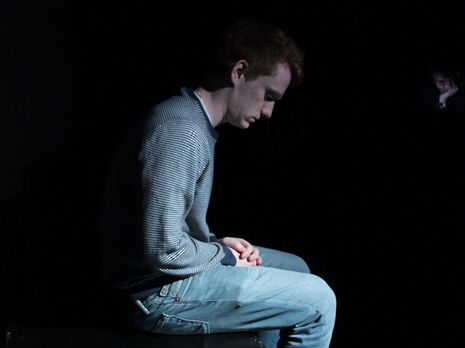Theatre: Five Kinds of Silence
Anne O’Neill on an urgent, stirring, disturbing play

Five Kinds of Silence is one of the most powerful, unsettling and morally complex pieces of theatre I have ever seen, and a brave challenge for a student company to undertake. Through monologues and interviews, a decades-long tale of physical, emotional and sexual abuse to which Billy subjected his wife, Mary, and daughters, Susan and Janet, is revealed. And Billy is given a voice of his own, recounting his own childhood of abuse, affording the audience a glimpse of his frightening and troubled psyche.
Every member of the cast is superb, but Ed Broadbent is nothing short of mesmerising in his chilling depiction of the psychopathic Billy, who exerts total control over every aspect of his family’s life, right down to his bewildering obsession with filling shelves with provisions for some approaching catastrophe. Broadbent, unassuming in both stature and demeanour, challenges the stereotype of the physically imposing abuser and throws himself, body and mind, into the character.
As well as unflinchingly exploring the nature of abuse itself, Five Kinds of Silence emphasises the insidious ways in which abuse poisons the mind. Mary’s interjections of “if you don’t mind” when she refuses to answer questions, like Susan’s anxious qualification that her father was only violent “sometimes”, add to the picture of broken human beings who have been indelibly marked by long-term, daily oppression. In one of a string of harrowing scenes, Susan expresses her confusion about the sexual relationship she was forced to conduct with her father and is torn between revulsion and the desire to feel loved. “He was my only lover” is one of the most gut-wrenching utterances in a play filled with painful truths.
Billy’s total domination is effectively represented by his continued presence on-stage, often speaking over his family, as if his voice is still resounding in their heads or reaching out to touch them. This is a very physical play, and Director Marthe de Ferrer’s decision to eschew realism in favour of stylised depictions of violence is largely successful, serving to make the violence more visceral. The staging is suitably minimalist, training focus entirely on the actors. Music is a prominent feature of the production with a number of atypical choices. It's a bold move to pair lilting, almost jaunty pieces with emotionally raw scenes – one which doesn’t always pay off. Yet the supremely talented cast of this play continually draws the audience in and testify to the power of words in the mouths of those who know how to use them.
Five Kinds of Silence is an unrelentingly bleak depiction of what a human being can suffer behind closed doors. There are tiny glimmers of hope, as Mary and her daughters speak about their hopes for the future, of living together in a house with “pink carpets”. Yet there is no quick-fix, no panacea for such depths of suffering, and one’s heart sinks at the end when Mary proclaims proudly that they’ve “already bought the shelving”. Billy lives on.
Five Kinds of Silence runs at the Corpus Playroom until Saturday, 1 February
 News / SU reluctantly registers controversial women’s soc18 December 2025
News / SU reluctantly registers controversial women’s soc18 December 2025 Features / Should I stay or should I go? Cambridge students and alumni reflect on how their memories stay with them15 December 2025
Features / Should I stay or should I go? Cambridge students and alumni reflect on how their memories stay with them15 December 2025 News / Dons warn PM about Vet School closure16 December 2025
News / Dons warn PM about Vet School closure16 December 2025 News / Cambridge study finds students learn better with notes than AI13 December 2025
News / Cambridge study finds students learn better with notes than AI13 December 2025 News / Uni registers controversial new women’s society28 November 2025
News / Uni registers controversial new women’s society28 November 2025









